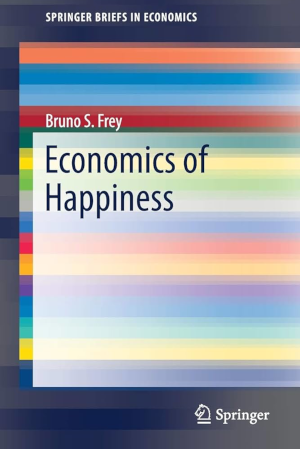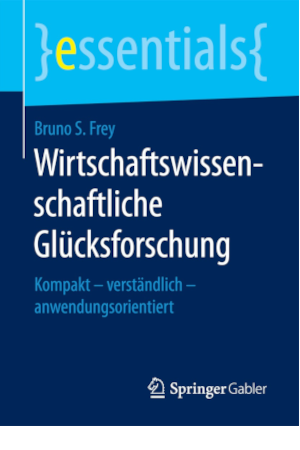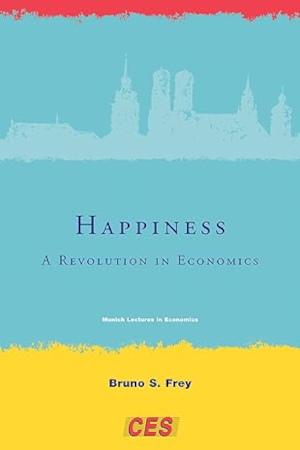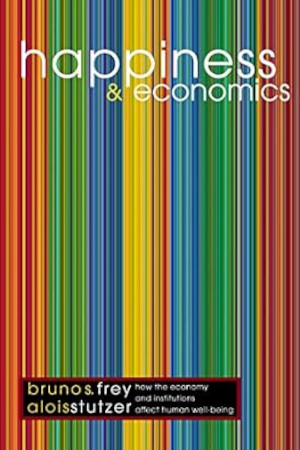Books

Economics of Happiness (Bruno S. Frey, 2018)
This book focuses on what makes people happy. The author explains methods for measuring subjective life satisfaction and well-being by discussing economic and sociodemographic factors, as well as the psychological, cultural and political dimensions of personal happiness.
Does higher income increase happiness? Are people in rich countries, such as the United States, the United Kingdom and Scandinavian countries, happier than those living elsewhere? Does losing one’s job make one unhappy? What is the role of genetic endowments inherited from our parents? How important are physical and emotional health to subjective life satisfaction? Do older people tend to be happier, or younger people? Are close social relationships necessary for happiness? Do political conditions, such as respect for human rights, democracy and autonomy, play a part? How can governments contribute to the population’s happiness? This book answers these questions on the basis of extensive interdisciplinary research reflecting the current state of knowledge.
The book will appeal to anyone interested in learning more about the various dimensions of personal well-being beyond the happiness-prosperity connection, as well as to policymakers looking for guidance on how to improve happiness in societies.

Wirtschaftswissenschaftliche Glücksforschung - Springer Essentials (Bruno S. Frey, 2017)
Dieses essential beschäftigt sich mit der Frage, was uns Menschen glücklich macht. Bruno S. Frey erläutert Messmethoden, wirtschaftliche Faktoren, soziodemografische Einflüsse sowie politische Dimensionen des Glücks. Steigert ein höheres Einkommen die Zufriedenheit? Wird, wer die Arbeit verliert, unglücklich? Wie wichtig ist die physische und psychische Gesundheit für die Lebenszufriedenheit? Sind alte oder junge Menschen glücklicher? Braucht es intensive soziale Beziehungen, um glücklich zu werden? Welche Rolle spielen die politischen Bedingungen, wie die Beachtung der Menschenrechte, Demokratie und Autonomie? Und was kann die Regierung zum Glück ihrer Einwohner beitragen? Diese Fragen werden auf der Grundlage umfassender wissenschaftlicher Untersuchungen auf dem Stand des heutigen Wissens beantwortet.

Glück - Die Sicht der Ökonomie (Bruno S. Frey & Claudia Frey Marti, 2010)
In einer repräsentativen Umfrage bezeichnet sich gut die Hälfte der befragten Schweizerinnen und Schweizer als glücklich und mehr als ein Drittel sogar als sehr glücklich. Befragte in Deutschland oder den USA geben ein vergleichsweise tieferes Glücks- beziehungsweise Lebenszufriedenheitsniveau an.
Wovon hängt aber unser Glück beziehungsweise unsere Lebenszufriedenheit ab? Dieses Buch zeigt, wie der renommierte Ökonom Bruno S. Frey die Einflussfaktoren des Glücks erfasst und unter welchen Bedingungen Menschen (noch) glücklicher werden können.
Ausgehend von umfangreichen Erhebungen, die in verschiedenen Ländern und für verschiedene Zeitperioden bei Hunderttausenden von Personen durchgeführt worden sind, werden die Zusammenhänge zwischen verschiedenen wirtschaftlichen und ausserwirtschaftlichen Lebensbereichen und der Lebenszufriedenheit empirisch geschätzt. Welchen Einfluss auf unsere Lebenszufriedenheit haben beispielsweise das Einkommen, Arbeitslosigkeit, Demokratie und Föderalismus, Heirat oder der Fernsehkonsum? Dabei stellt sich auch die Frage der Kausalität: Macht Heirat glücklich? Oder neigen glückliche Leute eher zum Heiraten? – Macht Arbeitslosigkeit unglücklich? Oder werden unglückliche Leute eher arbeitslos?

Happiness - A Revolution in Economics (Bruno S. Frey, 2008)
Revolutionary developments in economics are rare. The conservative bias of the field and its enshrined knowledge make it difficult to introduce new ideas not in line with received theory. Happiness research, however, has the potential to change economics substantially in the future. Its findings, which are gradually being taken into account in standard economics, can be considered revolutionary in three respects: the measurement of experienced utility using psychologists’ tools for measuring subjective well-being; new insights into how human beings value goods and services and social conditions that include consideration of such non-material values as autonomy and social relations; and policy consequences of these new insights that suggest different ways for government to affect individual well-being. In Happiness, emphasizing empirical evidence rather than theoretical conjectures, Bruno Frey substantiates these three revolutionary claims for happiness research. After tracing the major developments of happiness research in economics and demonstrating that we have gained important new insights into how income, unemployment, inflation, and income demonstration affect well-being, Frey examines such wide-ranging topics as democracy and federalism, self-employment and volunteer work, marriage, terrorism, and watching television from the new perspective of happiness research. Turning to policy implications, Frey describes how government can provide the conditions for people to achieve well-being, arguing that a crucial role is played by adequate political institutions and decentralized decision making. Happiness demonstrates the achievements of the economic happiness revolution and points the way to future research.

Happiness and Economics: How the Economy and Institutions Affect Human Well-Being (Bruno S. Frey & Alois Stutzer, 2002)
Curiously, economists, whose discipline has much to do with human well-being, have shied away from factoring the study of happiness into their work. Happiness, they might say, is an ''unscientific'' concept. This is the first book to establish empirically the link between happiness and economics--and between happiness and democracy. Two respected economists, Bruno S. Frey and Alois Stutzer, integrate insights and findings from psychology, where attempts to measure quality of life are well-documented, as well as from sociology and political science. They demonstrate how micro- and macro-economic conditions in the form of income, unemployment, and inflation affect happiness. The research is centered on Switzerland, whose varying degrees of direct democracy from one canton to another, all within a single economy, allow for political effects to be isolated from economic effects.
